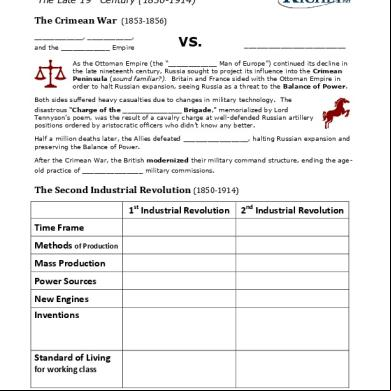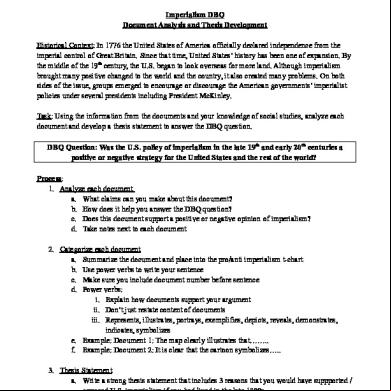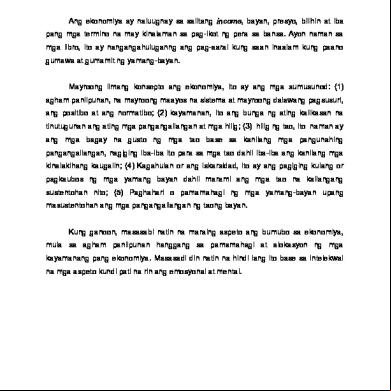Imperialism 70w2y
This document was ed by and they confirmed that they have the permission to share it. If you are author or own the copyright of this book, please report to us by using this report form. Report 3b7i
Overview 3e4r5l
& View Imperialism as PDF for free.
More details w3441
- Words: 1,386
- Pages: 6
Imperialism in Africa Mini-Q
Document A ---...-
Source: Partition of Africa, 1884-85. Map Created from various sources.
-
Madeira Is. (Portugal)••
Fernando Po. (Spain) --.,
SPANISH GUINE Sac Tomi
ATLANTIC OCEAN
(Portugal)
o
British
EZI Portuguese
•
French
~
Belgian
~
German
•
Spanish
o
IlJ Italian
o I o
300 I
300
I
Independent states
African
600 Miles I
!
600 Kilometers
Document Analysis 1. How many European countries held African colonies by 1914? 2. Which two European countries were the biggest winners in the race to seize African colonies? 3. Was in a position to block a British dream of building a railroad from the Mediterranean Sea to South Africa (i.e. from Cairo to Capetown)? Explain. 4. Which two African countries remained independent? 5. How could this document be used to explain a driving force behind European imperialism in Africa?
© 2012 The DBQ Project
263 This page may be reproduced for classroom use
Imperialism
in Africa
Mini-Q
Document B Source: John Ruskin, lecture at Oxford University, February 8, 1870.
Note: John Ruskin (1819-1900) was a well regarded English intellectual, author, and speaker whose interests ranged from art critic to social reformer. This talk at Oxford was delivered to a standing room only crowd. A short excerpt follows.
-
[Will the] youths of England, make your country again a royal throne of kings; ... for all the world a source of light, a center of peace? ..(T)his is what [England] must either do or perish: she must found colonies as fast and as far as she is able, formed of her most energetic and worthiest men; - seizing every piece of fruitful waste ground she can set her foot on, and there teaching these her colonists ... that their first aim is to be to advance the power of England by land and by sea.
Source: Freidrich Fabri, Does Need Colonies? 1879. Note: Freidrich Fabri (1824-1891) has been called the "father of the German colonial movement." Fabri was impressed by the colonial achievements of the English and wanted to do something of the same. His book was quite well received.
But should not the German nation who is fundamentally so very capable, so seaworthy, so industrially and commercially minded ... successfully pave the way for this new course? ... It would be wise if we Germans would learn about colonial skills from our Anglo-Saxon cousins and would begin-in a friendly competition-to strive after them. When the German Reich centuries ago was at the peak of the states in Europe, it was the Number One trade and sea power. Should the New German Reich wish to prove and maintain its newly won position of power for a long time, it will have to take up the same culturemission and delay no longer to acknowledge its colonial task anew. Document Analysis 1. Why does Ruskin say England must found colonies "as fast and far as she is able"? 2. What does he say should be the colonists' "first aim"? 3. According to Fabri, what were 's strengths when it was "at the peak of the states in Europe"?
4. Why does Fabri believe that needs to "strive after" colonies?
5. What is the driving force behind European imperialism in Africa, according to these two sources?
©2012The DBa Project
This page may be reproduced for classroom use
265
Imperialism in Africa Mini-Q
Document C Source: Information drawn from various sources .. Note: The Industrial Revolution led to many discoveries and inventions that helped Europeans to take over Africa.
-
Stearn engine (1787) first used in boats; (1804) first used in locomotives
A more constant and forceful source of power than sails on ships or horse-drawn carriages. Stearn engines powered ships and railroads.
Method of getting quinine from cinchona tree bark (1820)
Treatment for the disease malaria
Electric telegraph (1837)
Communication over long distances
Bessemer process (1855)
Quicker and cheaper method of manufacturing steel, which was lighter and more durable than iron
Maxim gun (1884)
First machine gun
Repeating rifle (late 1800s)
A faster-loading gun that was able to fire multiple shots more accurately than older muskets
Document Analysis 1. During which century was most of the technology in this chart invented? 2. Which technological advancement cured a tropical disease? Which of the technological developments gave European armies an advantage over African armies? 3. Which of the inventions do you think would have been the most important for spreading European influence in Africa?
4. How could this document be used to explain the primary cause of European imperialism in Africa?
5. Are technological factors more of a primary cause of European imperialism in Africa than political reasons or national pride?
267 © 2012 The DBQ Project
This page may be reproduced for classroom use
Imperialism in Africa Mini-Q
Document D Source: Information drawn from various sources.
Selected African Colonies and Their Exports
African Colony
Resources Exported
-
Industrial or Economic Use
(European Colonizer)
.~---
Document Analysis 1. What European industries benefited from African resources? 2. If you owned a textile mill, which colony or colonies would you want your country to rule? Explain. 3. Which European country do you think had the most valuable colonies? Why? 4. How could this document be used to explain the primary cause of European imperialism in Africa?
5. Are trade and markets more important reasons for European imperialism in Africa than politics and nationalism or technology?
© 2012 The DBQ Project
269 This page may be reproduced for classroom use
Imperialism
in Africa
Mini-Q
Document E Source: Trevor Owen Lloyd, The British Empire: 1558-1995, 1996.
Great Britain and South Saharan Africa Imports and Exports, 1854 and 1900
-
25~----------------------------------' Imports from Africa
II
Exports to Africa
20~-------------------------(f)
-0
c:::
:::l
o a. .J:: .~ 151----------------
·c
co '+-
o (f)
c:::
.2
·E
101----------------
.S;;
-
~ .9
51-------------
OL----" Africa, South of Sahara
1854
Africa, South of Sahara 1900
Document Analysis 1. How much money did Great Britain make from exports to South Saharan Africa in 1854? In 1900? 2. Describe the difference between Great Britain's imports from and exports to Africa in 1854 and 1900. Which experienced a higher rate of growth?
3. According to this chart, what benefit is Great Britain deriving from its African colonies?
4. How could this document be used to explain an important cause of European imperialism in Africa?
5. Are economic factors more of driving force behind European imperialism than national pride? Than improved technology?
© 201 2 The DBQ Project
271 This page may be reproduced for classroom use
Imperialism
in Africa
Mini-Q
Document F Source: Rudyard Kipling, "The White Man's Burden," 1899.
Take up the White Man's burdenSend forth the best ye breedGo bind your sons to exile To serve your captives' need; To wait in heavy harness, On fluttered folk and wildYour new-caught, sullen peoples, Half-devil and half-child ...
Take up the White Man's burdenThe savage wars of peaceFill full the mouth of Famine And bid the sickness cease; And when your goal is nearest The end for others sought, Watch sloth and heathen Folly Bring all your hopes to nought. ..
-
Source: Lobengula Khumalo, chief of the South African Ndebele (Matabele) tribe, early 1890s.
Did you ever see a chameleon catch a fly? The chameleon gets behind the fly and remains motionless for some time, then he advances very slowly and gently, first putting forward one leg and then another. At last, when well within reach, he darts out his tongue and the fly disappears. England is the chameleon and I am that fly.
Document Analysis 1. Who is Kipling talking to when he says, "Send forth the best ye breed"? Who does Kipling mean when he refers to "Your new-caught, sullen peoples,/Half-devil and half-child"? 2. What does Kipling mean when he commands, "Fill full the mouth of Famine /And bid the sickness cease"? What does the title "The White Man's Burden" mean?
3. How might Chief Lobengula Khumalo respond to Kipling's poem?
4. How can this document be used to explain the primary cause of European imperialism in Africa?
5. Are cultural beliefs a more important driving force behind European imperialism in Africa than political, technological, or economic reasons? Explain.
© 2012 The DBQ Project
273 This page may be reproduced for classroom use
Document A ---...-
Source: Partition of Africa, 1884-85. Map Created from various sources.
-
Madeira Is. (Portugal)••
Fernando Po. (Spain) --.,
SPANISH GUINE Sac Tomi
ATLANTIC OCEAN
(Portugal)
o
British
EZI Portuguese
•
French
~
Belgian
~
German
•
Spanish
o
IlJ Italian
o I o
300 I
300
I
Independent states
African
600 Miles I
!
600 Kilometers
Document Analysis 1. How many European countries held African colonies by 1914? 2. Which two European countries were the biggest winners in the race to seize African colonies? 3. Was in a position to block a British dream of building a railroad from the Mediterranean Sea to South Africa (i.e. from Cairo to Capetown)? Explain. 4. Which two African countries remained independent? 5. How could this document be used to explain a driving force behind European imperialism in Africa?
© 2012 The DBQ Project
263 This page may be reproduced for classroom use
Imperialism
in Africa
Mini-Q
Document B Source: John Ruskin, lecture at Oxford University, February 8, 1870.
Note: John Ruskin (1819-1900) was a well regarded English intellectual, author, and speaker whose interests ranged from art critic to social reformer. This talk at Oxford was delivered to a standing room only crowd. A short excerpt follows.
-
[Will the] youths of England, make your country again a royal throne of kings; ... for all the world a source of light, a center of peace? ..(T)his is what [England] must either do or perish: she must found colonies as fast and as far as she is able, formed of her most energetic and worthiest men; - seizing every piece of fruitful waste ground she can set her foot on, and there teaching these her colonists ... that their first aim is to be to advance the power of England by land and by sea.
Source: Freidrich Fabri, Does Need Colonies? 1879. Note: Freidrich Fabri (1824-1891) has been called the "father of the German colonial movement." Fabri was impressed by the colonial achievements of the English and wanted to do something of the same. His book was quite well received.
But should not the German nation who is fundamentally so very capable, so seaworthy, so industrially and commercially minded ... successfully pave the way for this new course? ... It would be wise if we Germans would learn about colonial skills from our Anglo-Saxon cousins and would begin-in a friendly competition-to strive after them. When the German Reich centuries ago was at the peak of the states in Europe, it was the Number One trade and sea power. Should the New German Reich wish to prove and maintain its newly won position of power for a long time, it will have to take up the same culturemission and delay no longer to acknowledge its colonial task anew. Document Analysis 1. Why does Ruskin say England must found colonies "as fast and far as she is able"? 2. What does he say should be the colonists' "first aim"? 3. According to Fabri, what were 's strengths when it was "at the peak of the states in Europe"?
4. Why does Fabri believe that needs to "strive after" colonies?
5. What is the driving force behind European imperialism in Africa, according to these two sources?
©2012The DBa Project
This page may be reproduced for classroom use
265
Imperialism in Africa Mini-Q
Document C Source: Information drawn from various sources .. Note: The Industrial Revolution led to many discoveries and inventions that helped Europeans to take over Africa.
-
Stearn engine (1787) first used in boats; (1804) first used in locomotives
A more constant and forceful source of power than sails on ships or horse-drawn carriages. Stearn engines powered ships and railroads.
Method of getting quinine from cinchona tree bark (1820)
Treatment for the disease malaria
Electric telegraph (1837)
Communication over long distances
Bessemer process (1855)
Quicker and cheaper method of manufacturing steel, which was lighter and more durable than iron
Maxim gun (1884)
First machine gun
Repeating rifle (late 1800s)
A faster-loading gun that was able to fire multiple shots more accurately than older muskets
Document Analysis 1. During which century was most of the technology in this chart invented? 2. Which technological advancement cured a tropical disease? Which of the technological developments gave European armies an advantage over African armies? 3. Which of the inventions do you think would have been the most important for spreading European influence in Africa?
4. How could this document be used to explain the primary cause of European imperialism in Africa?
5. Are technological factors more of a primary cause of European imperialism in Africa than political reasons or national pride?
267 © 2012 The DBQ Project
This page may be reproduced for classroom use
Imperialism in Africa Mini-Q
Document D Source: Information drawn from various sources.
Selected African Colonies and Their Exports
African Colony
Resources Exported
-
Industrial or Economic Use
(European Colonizer)
.~---
Document Analysis 1. What European industries benefited from African resources? 2. If you owned a textile mill, which colony or colonies would you want your country to rule? Explain. 3. Which European country do you think had the most valuable colonies? Why? 4. How could this document be used to explain the primary cause of European imperialism in Africa?
5. Are trade and markets more important reasons for European imperialism in Africa than politics and nationalism or technology?
© 2012 The DBQ Project
269 This page may be reproduced for classroom use
Imperialism
in Africa
Mini-Q
Document E Source: Trevor Owen Lloyd, The British Empire: 1558-1995, 1996.
Great Britain and South Saharan Africa Imports and Exports, 1854 and 1900
-
25~----------------------------------' Imports from Africa
II
Exports to Africa
20~-------------------------(f)
-0
c:::
:::l
o a. .J:: .~ 151----------------
·c
co '+-
o (f)
c:::
.2
·E
101----------------
.S;;
-
~ .9
51-------------
OL----" Africa, South of Sahara
1854
Africa, South of Sahara 1900
Document Analysis 1. How much money did Great Britain make from exports to South Saharan Africa in 1854? In 1900? 2. Describe the difference between Great Britain's imports from and exports to Africa in 1854 and 1900. Which experienced a higher rate of growth?
3. According to this chart, what benefit is Great Britain deriving from its African colonies?
4. How could this document be used to explain an important cause of European imperialism in Africa?
5. Are economic factors more of driving force behind European imperialism than national pride? Than improved technology?
© 201 2 The DBQ Project
271 This page may be reproduced for classroom use
Imperialism
in Africa
Mini-Q
Document F Source: Rudyard Kipling, "The White Man's Burden," 1899.
Take up the White Man's burdenSend forth the best ye breedGo bind your sons to exile To serve your captives' need; To wait in heavy harness, On fluttered folk and wildYour new-caught, sullen peoples, Half-devil and half-child ...
Take up the White Man's burdenThe savage wars of peaceFill full the mouth of Famine And bid the sickness cease; And when your goal is nearest The end for others sought, Watch sloth and heathen Folly Bring all your hopes to nought. ..
-
Source: Lobengula Khumalo, chief of the South African Ndebele (Matabele) tribe, early 1890s.
Did you ever see a chameleon catch a fly? The chameleon gets behind the fly and remains motionless for some time, then he advances very slowly and gently, first putting forward one leg and then another. At last, when well within reach, he darts out his tongue and the fly disappears. England is the chameleon and I am that fly.
Document Analysis 1. Who is Kipling talking to when he says, "Send forth the best ye breed"? Who does Kipling mean when he refers to "Your new-caught, sullen peoples,/Half-devil and half-child"? 2. What does Kipling mean when he commands, "Fill full the mouth of Famine /And bid the sickness cease"? What does the title "The White Man's Burden" mean?
3. How might Chief Lobengula Khumalo respond to Kipling's poem?
4. How can this document be used to explain the primary cause of European imperialism in Africa?
5. Are cultural beliefs a more important driving force behind European imperialism in Africa than political, technological, or economic reasons? Explain.
© 2012 The DBQ Project
273 This page may be reproduced for classroom use










